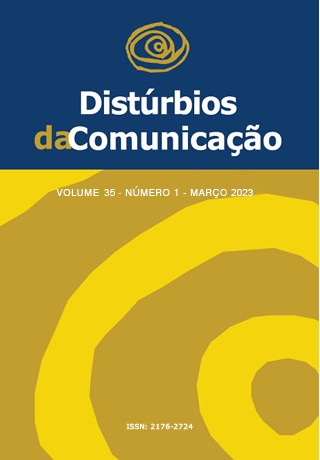Cognitive skills in older people with vestibular dysfunction undergoing vestibular rehabilitation
A pilot study
DOI:
https://doi.org/10.23925/2176-2724.2023v35i1e60065Keywords:
Cognition, Rehabilitation, Aged, Postural Balance, DizzinessAbstract
Introduction: Studies have reported improved cognitive skills after vestibular rehabilitation (VR). However, they used cognitive screening tests or other ones that assess specific cognitive skills, not assessing cognition in detail. Objective: To assess cognitive skills, depressive symptoms, functioning, and sociodemographic aspects in older adults with vestibular dysfunction before and after vestibular rehabilitation. Method: Longitudinal, analytical, quasi-experimental study. The sample had 11 older adults aged 60 to 89 years, of both sexes, all of them with vestibular dysfunction verified with VEMP and/or vHIT examination. Participants were submitted to cognitive, functioning, and depressive symptoms assessment before and after eight weekly VR sessions. Results: MMSE was associated with educational attainment and DHI; the Pfeffer questionnaire was correlated with DHI; GDS-15 was correlated with VAS and BBS. After VR, there were improvements in gain in the right anterior semicircular canal, VAS, DHI and its physical, functional, and emotional subscales, GDS-15, and Neupsilin total score and its perception, memory, and praxis subscales. Conclusion: After VR, the vestibulo-ocular reflex gain increased, the impacts of dizziness on the quality of life and the psychological suffering decreased, and the overall cognitive function and perception, memory, and praxis skills improved.
Downloads
References
Cuevas-Trisan, R. Balance problems and fall risks in the elderly. Clin Geriatr Med. 2019;35(2):173-83.
Ganança F. Definições dos sintomas vestibulares. I Fórum Brasileiro de Otoneurologia. 2019;1(1): 13-27.
Casale J, Browne T, Murray I, Gupta G. Physiology, Vestibular System. StatPearls Publishing, Treasure Island (FL). 2022; 8(1):1-40.
Dieterich M, Brandt T. The parietal lobe and the vestibular system. Handb Clin Neurol. 2018; 151(1): 119-40.
Lee JO, Lee ES, Kim JS, Lee YB, Jeong Y, Choi BS et al. Altered brain function in persistent postural perceptual dizziness: A study on resting state functional connectivity. Hum Brain Mapp. 2018; 39(8): 3340-53.
Bigelow, RT. Agrawal, Y. Vestibular involvement in cognition: Visuospatial ability, attention, executive function, and memory. J Vestib Res. 2015; 25(2): 73–89.
Sun L, Xiang K. A review on the alterations in the brain of persistent postural-perceptual dizziness patients and non-pharmacological interventions for its management. Rev Neurosci. 2020 Aug 27; 31(6): 675-80.
Coelho, AR. Lambertti, JL. Perobelli, LSS. Moraes, R. Barros, CGC. Abreu, DCC. Severe Dizziness Related to Postural Instability, Changes in Gait and Cognitive Skills in Patients with Chronic Peripheral Vestibulopathy. Int Arch Otorhinolaryngol. 2020; 24(1): e99–e106.
Tramontano M, Prince AA, Angelis A, Indolvina I Manzari L. Vestibular rehabilitation in patients with persistent postural-perceptual dizziness: a scoping review. Hearing, Balance and Communication. 2021; 19(4): 282-90.
Lopes AL, Lemos SMA, Chagas CA, Araújo SG, Santos JN. Scientific evidence of vestibular rehabilitation in primary health care: a systematic review. Audiol Commun Res. 2018; 23(1): e2032.
Cawthorne, T. Vestibular injuries. Proc R Soc Med. 1946; 39(5): 270-3.
Cooksey, FS. Rehabilitation in vestibular injuries. Proc R Soc Med. 1946; 39(5): 273-8.
Evangelista ASL, Cordeiro ESG, Nascimento GFF, Gazzola JM, Araújo ES, Mantello EB. Speech-Language-Hearing intervention in vestibular rehabilitation with the use of technologies: an integrative literature review. Rev. CEFAC. 2019; 21(6): e2219.
Sugaya, N. Arai, M. Goto, F. Changes in cognitive function in patients with intractable dizziness following vestibular rehabilitation. SCieNTiFiC ReporTS. 2018; 8(1): 9984
Micarelli, A. Viziano, A. Bruno, E. Micarelli, E. Augimeri, I. Alessandrini, M. Gradient impact of cognitive decline in unilateral vestibular hypofunction after rehabilitation: preliminary findings. Eur Arch Otorhinolaryngol. 2018; 275(10): 2457–65.
Sahni RK, et al. Effect of Vestibular Rehabilitation on Cognition and Eye Hand Coordination in Elderly. Indian Journal of Physiotherapy and Occupational Therapy. 2019; 13(2): 161-5.
Micarelli, A. Viziano, A. Micarelli, B. Augimeri, I. Alessandrini, M. Vestibular rehabilitation in older adults with and without mild cognitive impairment: Effects of virtual reality using a head-mounted display. Arch Gerontol Geriatr. 2019; 83(1): 246–56.
Guidetti G, Guidetti R, Manfredi M, Manfredi M. Vestibular pathology and spatial working memory. Acta Otorhinolaryngologica Italica. 2020; 40(1): 72-8.
Castro, ASO. Gazzola, JM. Natour, J. Ganança, FF. Versão brasileira do Dizziness Handicap Inventory. Pró-Fono Revista de Atualização Científica. 2007; 19(1): 97-104.
Whitney SL, Herdman SJ. Physical therapy assessment of vestibular hypofunction. In: Herdman SJ. Vestibular rehabilitation. Philadelphia: FA. Davis. 2000; 1(1): 336.
Miyamoto, ST. Lombardi, Jr I. Berg, KO. Ramos, LR. Natour, J. Brazilian version of the Berg balance scale. Brazilian Journal of Medical and Biological Research. 2004; 37(9): 1411-21.
Ribeiro, MBN. Mancini, PC. Comparison of cervical and ocular VEMP responses in individuals with and without otoneurological diseases. Distúrb Comun. 2020; 32(3): 406-13.
Ribeiro, MBN. Morganti, LOG. Mancini, PC. Evaluation of the influence of aging on vestibular function by the video Head Impulse Test (v-HIT). Audiol Commun Res. 2019; 24(1): e2209.
Brucki, SMD. Nitrini, R. Caramelli, P. Bertolucci, PHF. Okamoto, IH. Suggestions for utilization of the mini-mental state examination in Brazil. Arq Neuropsiquiatr. 2003; 61(3B): 777-81.
Fonseca, RP. Salles, JF. Parente, MAMP. Development and content validity of the Brazilian Brief Neuropsychological Assessment Battery Neupsilin. Psychology and Neuroscience. 2009; 1(1): 55-62.
Dutra, MC. Ribeiro, RS. Pinheiro, SB. Melo, GF. Carvalho, GA. Accuracy and reliability of the Pfeffer Questionnaire for the Brazilian elderly population. Dement Neuropsychol. 2015; 9(2): 176-83.
Almeida, OP. Almeida, SA. Confiabilidade da versão brasileira da Escala de Depressão em Geriatria (GDS) versão reduzida. Arq Neuropsiquiatr. 1999; 57(2B): 421-6.
Ribeiro MBN, Mancini PC, Bicalho MAC. Habilidades cognitivas envolvidas na avaliação e reabilitação vestibular: revisão integrativa. Distúrb Comun, São Paulo, 2022; 34(2): e55278.
Whitney SL, Sparto PJ, Furman JM. Vestibular Rehabilitation and Factors That Can Affect Outcome. Semin Neurol. 2020; 40(1): 165-172.
Peluso ETP, Quintana MI, Ganança FF. Anxiety and depressive disorders in elderly with chronic dizziness of vestibular origin. Braz J Otorhinolaryngol. 2016; 82(2): 209-14.
Downloads
Published
Issue
Section
License
Copyright (c) 2023 Marlon Bruno Nunes Ribeiro, Patrícia Cotta Mancini, Maria Aparecida Camargos Bicalho

This work is licensed under a Creative Commons Attribution 4.0 International License.









